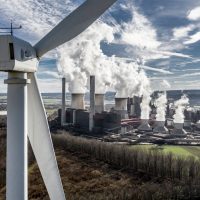Air pollution is made up of particles or chemical gases in the air that can cause health problems. Using fossil fuels not only accelerates climate change, it also pollutes the air we breathe.
Burning oil and coal releases carbon dioxide along with a host of other pollutants. Gases such as nitrogen oxides and ozone fill the surrounding air and tiny particles work their way deep into our lungs.
Health impacts of air pollution
The health impacts of air pollution are profound, including respiratory problems, heart disease and shortened life expectancy. Children are especially affected by air pollution, which can stunt lung growth and cause health problems like asthma throughout their lives.
The death toll from air pollution globally is estimated to be nine million people per year. This is more than from smoking (eight million), and around seven times higher than people who die in road accidents (1.3 million) – and hundreds of times more than deaths from war and terrorism.
Researchers estimate that in the UK, nearly 50,000 adults die early because of health impacts from tiny particles in air pollution.
The head of the World Health Organisation called air pollution “the new tobacco”, although he noted that you can move away from cigarette smoke. But when your home or school is surrounded by air pollution, there’s no escape.
What are the solutions to air pollution?
One of the most important ways to end the air pollution crisis is to phase out all vehicles that run on petrol or diesel from our roads.
As well as switching to electric cars and public transport, this also means giving people more options to walk and cycle, instead of drive. Moving around like this is cheaper and healthier too – and avoids adding more vehicles to traffic jams.
Governments are making policies to move people away from petrol and diesel cars. In the UK, clean air zones are already being introduced in cities like Bristol, Brighton, Oxford and London. These are now proven to make a difference to air quality, and initial studies on schemes around the world are showing that they are helping to improve health.
The UK government has committed to phasing out new petrol and diesel cars by 2035. Norway, the world leader for electric car sales, plans to ban petrol and diesel cars by 2025. Other European countries are following suit.
While petrol and diesel-powered vehicles are the largest source of air pollution in the city, particle pollution also comes from all vehicles’ tyres and brakes. This is one reason why electric vehicles, especially the bigger and heavier they get, are not the whole solution to air pollution.
And air pollution doesn’t just come from vehicles – it comes from wood burners and cooking stoves. Agriculture is also a major source of air pollution. Even in cities, ammonia from fertilisers and animal waste blows in, adding to the particles and gases emitted by vehicles.
What’s the problem with diesel?
Diesel used to be seen by the government as a more climate-friendly fuel than petrol because it releases less carbon dioxide. As a result, incentives for diesel vehicles encouraged us to buy them. However, we know now that those claims were exaggerated by car manufacturers.
Also, simply switching from one fossil fuel to another ignores the fact that we need to stop burning them altogether. Additionally, diesel cars produce more nitrogen dioxide (NO2) pollution. Most urban areas in the UK have illegal levels of NO2 pollution, which can stunt lung development in children. Around a third of all vehicles on UK roads run on diesel.
In cities around the world, safe limits are breached many times over and governments are failing to act. Each year in London, the legal limits set by the EU have been broken within just a few weeks of the new year.
The government has failed to meet the EU’s air pollution standards and its air quality plans have been judged in court to be unlawful – not once, not twice, but three times.
Car companies’ responsibility for air pollution
Car companies have long been avoiding responsibility for air pollution, and lying about how much pollution their cars produce. For years, car companies have rigged emissions tests for their vehicles so they appear less polluting than they really are.
Customers have been buying cars based on false information and plans to improve air quality have been undermined. But even though VW and other companies involved in the scandal have been hit hard, they’re still allowed to get away with tests that don’t reflect real driving conditions.


